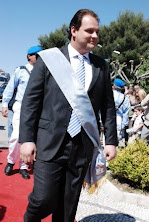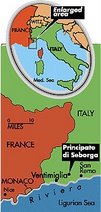 A legal action that kept going for more than six years revives the fight for the recognition of the juridical sovereignty of the Principality of Seborga.
A legal action that kept going for more than six years revives the fight for the recognition of the juridical sovereignty of the Principality of Seborga.The contention is about the house where the Seborga Government resides. Several years ago, the owner of the building, Mr Italo Incollino, decided to reclaim his property lent to the Government by its ministers.
He tried but failed to evict the “tenant” and after several unsuccessful attempts to resolve the issue, the Government decided to suspend the payments. The owner took legal action through the Italian Court against the Seborga Government.
In the last six years the case was examined several times by four different judges without reaching a decision.
Finally, on the 5th of April 2007 the Judge, Ms.Erika Cannoletta of the Sanremo Trinunal, reached a stunning conclusion: the legal action cannot proceed because: “… it cannot subsist exclusive jurisdiction of a State not recognised by the Italian State but regarded as such by other communities and/or foreign States recognised by Italy”.
In other words, the Judge has suspended the verdict, sent the documentation to the Italian Constitutional Court (High Court) and informed the Prime Minister and the two Presidents of the Parliament and Senate of the matter.
In her explanation, the Judge has taken into consideration several historical facts.
As stated by Judge Cannoletta, in 1729 Vittorio Amedeo II stipulated the contract of purchase but the transaction was never recorded and as a result was not valid.
Nor was Seborga annexed to the Republic of Genoa (as it appears in the Aquisgrana Treaty) and was not mentioned in the Vienna Congress”.
Judge Cannoletta deferred the verdict by quoting the Italian Constitution, the Civil Code and a 1995 Italian law. In her final ruling, she analyses the concept of State, investigates the literature available on the subject, the legitimacy to exist in a case of non recognition and examines all these aspects in relation to Seborga.
In Seborga, the outcome was welcomed with a reaction of surprise and yet great satisfaction. In contrast to this almost unanimous response there was a strong negative reaction from one of the members of the Seborga Municipality, the councillor for Culture, Mr Gustavo Ottolenghi.
Speaking to a local newspaper the councillor contradicted the finding of the judge and declared that: “… Seborga is a town not a Principality. This administration wants to make this clear once and for all. At a folkloric and tourist level, Giorgio (the Prince) has done a lot for Seborga, but you cannot put in doubt the municipal institution”.
These very strong words have not been welcomed by the other members of the council nor by the population. For some, these words demonstrate some long held resentment against the Prince that the councillor has not yet dispelled. Mr Giorgio Pistone, curator of the Historical Library, author of several books on local history and Spokesperson for the Principality declared: “Ottolenghi was in the past a member of the Chivalry of the Crown but then was expelled by the Prince himself for high treason”.
Leaving aside personal grudges, in commenting on the judge’s ruling, Mr Pistone declared: “The judge has made a very thorough and articulate decision, with rigor and professionalism. She has opened for us a door that was closed for 20 years. Now we can proceed as soon as the Constitutional Court decides on the case”.
Mr Pistone explained: “If the Italian Constitutional Court recognises the Italian legal standing, we will appeal to the European Court for the Human Rights. If the Constitutional Court does not recognise the Italian legal standing, it will mean that Italy is recognising the juridical sovereignty of Seborga”. The Seborgans could not wish for more from this development.
There is no doubt that what lies ahead is an interesting season for Seborga, full of surprises. Whatever the outcome, the Principality will continue to generate news and the rest of the world will continue to try to understand the complexity of the reality of this tiny territory in the Ligurian region that has for many years claimed its sovereignty.
Coincidently, the German national broadcaster has commissioned a half hour television documentary on the history of Seborga and the Principality. The project has already made a start with the research and preparation of the scripts and the filming should take place this August.
Mr Pistone explained: “If the Italian Constitutional Court recognises the Italian legal standing, we will appeal to the European Court for the Human Rights. If the Constitutional Court does not recognise the Italian legal standing, it will mean that Italy is recognising the juridical sovereignty of Seborga”. The Seborgans could not wish for more from this development.
There is no doubt that what lies ahead is an interesting season for Seborga, full of surprises. Whatever the outcome, the Principality will continue to generate news and the rest of the world will continue to try to understand the complexity of the reality of this tiny territory in the Ligurian region that has for many years claimed its sovereignty.
Coincidently, the German national broadcaster has commissioned a half hour television documentary on the history of Seborga and the Principality. The project has already made a start with the research and preparation of the scripts and the filming should take place this August.



